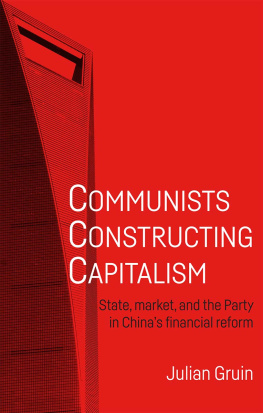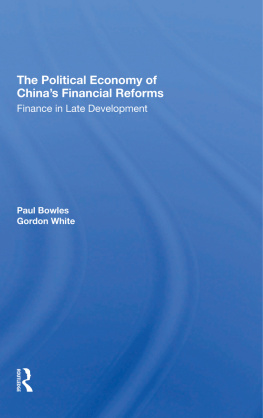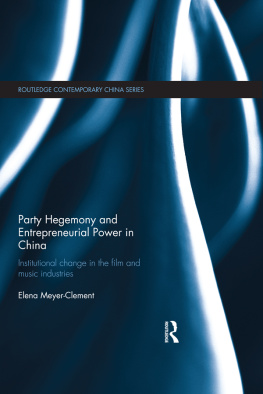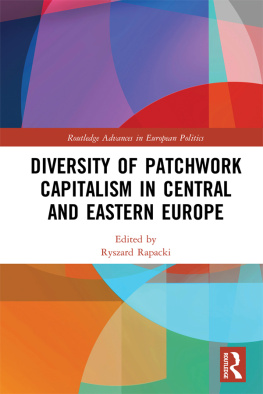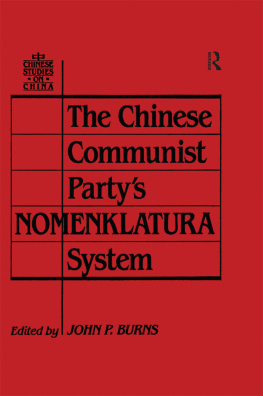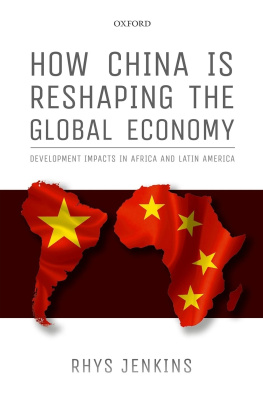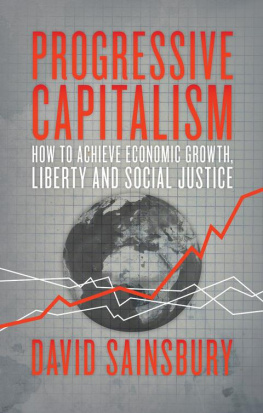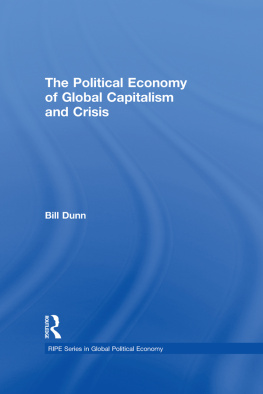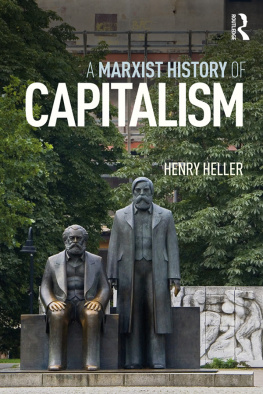Julian Gruin - Communists Constructing Capitalism
Here you can read online Julian Gruin - Communists Constructing Capitalism full text of the book (entire story) in english for free. Download pdf and epub, get meaning, cover and reviews about this ebook. year: 2019, genre: Politics. Description of the work, (preface) as well as reviews are available. Best literature library LitArk.com created for fans of good reading and offers a wide selection of genres:
Romance novel
Science fiction
Adventure
Detective
Science
History
Home and family
Prose
Art
Politics
Computer
Non-fiction
Religion
Business
Children
Humor
Choose a favorite category and find really read worthwhile books. Enjoy immersion in the world of imagination, feel the emotions of the characters or learn something new for yourself, make an fascinating discovery.
- Book:Communists Constructing Capitalism
- Author:
- Genre:
- Year:2019
- Rating:3 / 5
- Favourites:Add to favourites
- Your mark:
- 60
- 1
- 2
- 3
- 4
- 5
Communists Constructing Capitalism: summary, description and annotation
We offer to read an annotation, description, summary or preface (depends on what the author of the book "Communists Constructing Capitalism" wrote himself). If you haven't found the necessary information about the book — write in the comments, we will try to find it.
Communists Constructing Capitalism — read online for free the complete book (whole text) full work
Below is the text of the book, divided by pages. System saving the place of the last page read, allows you to conveniently read the book "Communists Constructing Capitalism" online for free, without having to search again every time where you left off. Put a bookmark, and you can go to the page where you finished reading at any time.
Font size:
Interval:
Bookmark:

COMMUNISTS CONSTRUCTING CAPITALISM


Series editors: Richard Madsen and Yangwen Zheng
This series provides a dedicated outlet for monographs and possibly edited volumes that take alternative views on contemporary or historical China; use alternative research methodologies to achieve unique outcomes; focus on otherwise understudied or marginalized aspects of China, Chineseness, or the Chinese state and the Chinese cultural diaspora; or generally attempt to unsettle the status quo in Chinese Studies, broadly construed. There has never been a better time to embark on such a series, as both China and the academic disciplines engaged in studying it seem ready for change.
Previously published
The advocacy trapStephen Noakes
Communists constructing capitalism
State, market, and the Party in Chinas financial reform
Julian Gruin
Manchester University Press
Copyright Julian Gruin 2019
The right of Julian Gruin to be identified as the author of this work has been asserted by him in accordance with the Copyright, Designs and Patents Act 1988.
Published by Manchester University Press
Altrincham Street, Manchester M1 7JA
www.manchesteruniversitypress.co.uk
British Library Cataloguing-in-Publication Data
A catalogue record for this book is available from the British Library
ISBN 978 1 52613 532 2 hardback
ISBN 978 1 5261 3534 6 paperback
First published 2019
The publisher has no responsibility for the persistence or accuracy of URLs for any external or third-party internet websites referred to in this book and does not guarantee that any content on such websites is, or will remain, accurate or appropriate.
Typeset in Monotype Fournier by
Servis Filmsetting Ltd, Stockport, Cheshire
To my parents, Rick and Yeats Gruin
The study of China has in recent decades seen an explosion as many universities have begun to offer modules ranging from Chinese history, politics and sociology to urban, cultural, and Diaspora studies. This is welcome news; the field grows when the world is hungry for knowledge about China. Chinese studies as a result have moved further away from the interdisciplinary tradition of Sinology towards more discipline-based teaching and research. This is significant because it has helped integrate the once-marginalised Chinese subjects into firmly established academic disciplines; practitioners should learn and grow within their own fields. This has also, however, compartmentalised Chinese studies as China scholars communicate much less with each other than before since they now teach and research in different departments; the study of China has lost some of its exceptionalism and former sheen.
Alternative Sinology calls for a more nuanced way forward. China scholars can firmly ground themselves in their own perspective fields; they still have the advantage of Sinology, the more holistic approach. The combination of disciplinary and area studies can help us innovate and lead. Now is an exciting time to take the study of China to new heights as the country has seen unprecedented change and offers us both hindsight and new observations. Alternative Sinology challenges China scholars. It calls on them to think creatively and unsettle the status quo by using new and alternative materials and methods to dissect China. It encourages them to take on understudied and marginalised aspects of China at a time when the field is growing and expanding rapidly. The case of China can promote the field and strengthen the individual discipline as well.
Zheng Yangwen and Richard Madsen
On 8 November 2008 in the heart of Beijings financial street [], an executive at one of Chinas big five state-owned commercial banks (SOCBs) received a phone call from the head of one of the banks offices in a city in Shandong province. The provincial bank head had dined the night before with a local Party official, and one topic dominated discussion: how they could maintain confidence in the financial system, free up liquidity and investment capital, and stimulate domestic demand. Three days previously, the Central Committee of the Communist Party of China (CCP) had issued Document No. 18, laying out ten policies to further expand domestic demand and assure stable rapid growth in the midst of global economic downturn, and cadres across the country were tripping over themselves to gear up plans and projects for investment (Liu Zebang
When I sat down with this executive in late 2012, sipping green tea in a corner office, the financial crisis had brought Western economies to their knees, and the triumphalism that had accompanied Chinas much-feted stimulus package and 8.7 per cent gross domestic product (GDP) growth in 2009 had begun to fade amidst growing awareness of wasteful investment projects, a further consolidation of economic power within the largest state-owned enterprises (SOEs), and a perception that ordinary households were amongst the last beneficiaries of the stimulus spending. We talked about this concept of economic disorder [jingji hunluan ] what it means, what causes it, and its implications. I asked about the lessons he drew from the 2008 financial crisis, and he said interesting but not entirely unexpected things about reducing inefficient state bureaucracy, about managing moral hazard, about limiting the innovation of complex financial products; but then he surprised me. He mentioned a different word for disorder [dongluan ], and said that neither the state nor the market were capable of managing this kind of disorder. This is a political word, not an economic one, and it connotes turmoil, unrest, upheaval. As China was accelerating financial reform, as the transformation of the state was gathering pace, the lesson that this banker took from the crisis was that it was neither the regulatory state nor the free market that prevented dongluan. It was the Party.
This vignette highlights three puzzling aspects of Chinas reform-era trajectory of development: (1) the embrace of the market; (2) the rationalization of the state; and (3) the undisputed political-economic authority of the CCP. As Xi Jinpings administration now confronts the mounting pressures of global economic turbulence and uncharted domestic economic terrain, important questions remain unanswered about how these features of Chinas political economy are connected, and how they are likely to evolve in the years to come. Simplifying somewhat, the core argument I develop in this book is that to understand these trends we have to look beyond the concepts of the state and the market as we have understood them in the liberal tradition of political economy, and instead theorize the politico-economic agency of the CCP itself, and in particular the ideas and conceptions of order that underpin this agency. Such factors have been largely neglected in existing accounts of Chinas financial development and reform, which remain focused on the more micro-level dynamics of political contestation within the state and market environments, without pausing to consider more broadly how these political and economic logics have interacted so as to produce a remarkably stable, if unbalanced and as yet potentially unsustainable, set of mechanisms for economic growth and the accumulation of capital. As I argue in this book, without accounting for the ideational cohesion that generated a powerful basis for CCP authority and control over the flow of capital throughout the economy, it becomes very difficult to understand both the resiliency of Party control and the commitment to market-based institutional reform. Although Chinese financial policymaking and development since the early 1990s has embodied a capitalist logic of economic growth and accumulation, the manifestation of this logic elides the traditional analytical dichotomy between the state and the market. Rather, this logic manifests in the CCP constituting the central feature of a system of socio-economic risk management that has functioned both to support economic growth, at the same time as a mechanism of political control. That is to say, the process of financial reform involved the construction of a system that would enable state-regulated and market-based economic growth at the same time as preserve CCP authority over the nature and structure of that growth.
Font size:
Interval:
Bookmark:
Similar books «Communists Constructing Capitalism»
Look at similar books to Communists Constructing Capitalism. We have selected literature similar in name and meaning in the hope of providing readers with more options to find new, interesting, not yet read works.
Discussion, reviews of the book Communists Constructing Capitalism and just readers' own opinions. Leave your comments, write what you think about the work, its meaning or the main characters. Specify what exactly you liked and what you didn't like, and why you think so.

